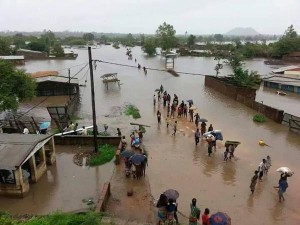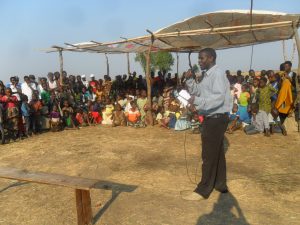Mc Carthy Samalani – an island in a flood.
- Published:
When Mc Carthy Jailos Samalani of the Islamic Organisation for Health and Development (ISOHEDE) based in Malawi participated in SAFCEI’s Environment Advocacy Training (FLEAT) in November 2014 he already had a broad understanding of environment issues and the human causes and costs. He returned to Malawi inspired by the leadership training and the sessions on problem solving involving case studies that the group of faith leaders from 4 Southern African countries had themselves identified.
Clearly a man of action, Mc Carthy convened a meeting of the ISOHEDE management to share his experiences at FLEAT and to get their support for environmental advocacy. He was especially excited by SAFCEI’s concept of “having the Green Bishop and Eco congregations which are powerful tools of engaging the faith community on taking a pivotal role on environmental management issues.” Mc Carthy emailed the FLEAT trainers to say that: ”ISOHEDE made the resolution to borrow a leaf from SAFCEI. They agreed to present the idea to the board, so that ISOHEDE can also establish Eco-Jamaat and crown a Sheikh as Green Imam who has interest on Environmental issues and who includes issues of Environment in his religious lecturing.”
It is tragic that the very issues that Mc Carthy spoke to the public about at an ISOHEDE awareness campaign in December, namely Climate Change increasing the risk of flooding, deforestation resulting in greater flood damage and badly managed waste causing water borne illness were realized with devastating impact with the January 2015 floods. During weeks of torrential rain over 600 000 Malawians were displaced by the worst flooding in half a century. For all too short a time the media ran stories of homes washed away like matchsticks, of livestock and fields of precious crops drowned, of entire villages swept off the map and of people drowned or lost and without a livelihood. While the media has turned to new disasters and intrigues, the community and faith based organisations working with international aid NGOs are frantically trying to help and house the devastated people. All are praying that as the water recedes there will be something to salvage of their homes and crops.
ISOHEDE, although a fairly small Muslim Faith based organisation has also contributed to providing relief aid by distributing clothes and providing trauma counselling. They circulated a letter to mosques and churches appealing to people of faith and the general public to provide any assistance to help the flood victims. Of critical importance was their insistence, driven by Mc Carthy, that the local District Health Officers treat and stop turning away flood victims who have lost their health passports.
With ISOHEDE’s support Mc Carthy visited 3 of the 15 affected districts namely: Zomba, Machinga and Nsanje to assess the situation on the ground. He provided counselling to traumatized flood victims and lobbied different stakeholders to provide relief supplies. Very significantly, as an involved and informed local, he was able to compile a comprehensive list of the key issues that needed to be addressed in the relief camps. These include: food shortages resulting in just one meal a day, lack of safe drinking water and inadequate toilet facilities both of which lead to increasing cases of cholera and dysentery, a shortage of mosquito nets resulting in an increase in Malaria, and sadly even sexual abuse of desperate young girls in exchange for money and toiletries.
 Mc Carthy Samalani at eco-awareness meeting
Mc Carthy Samalani at eco-awareness meeting
While we all pray that flooding and the resulting human tragedy will never happens again, at the same time, the reality of Climate Change is such that these tragedies are likely to re-occur. A hugely important consideration is the duration of support needed by the affected communities. Long after the flood waters have receded they will have no homes or livelihoods and few resources to start again. There are still people living in schools and halls. This means that they can’t get back to restart their lives and neither can the school children and other civic functions return to normal.
This story of the flooding in Southern Malawi provides yet another strong case for decisive decisions to curb greenhouse gas emissions in Paris in December 2015. The world’s leaders must not be allowed to ignore the suffering of these Malawians. On a more positive note Mc Carthy reports on two pro-active initiatives: ISOHEDE is supporting his initiative to implement a climate change adaptation project in some of the flood affected areas pending to the availability of funding. The project seeks to enhance resilience and aims to: provide seeds and fertilizer to flood victims for re-planting, to establish communal woodlots, to provide nutrition supplements to children, to facilitate a village and loan savings association and to enhance local environmental advocacy. I plan to “partner with a Christian faith based organization in order to have concerted effort from the Muslim and Christianity communities to address climate change problems,” he explained.
The minister of Energy, mining and natural resources Honourable Atupele Muluzi announced that his ministry has embarked on a tree planting campaign in an effort to avert future flooding in Malawi. The minister called on Malawians to take the initiative and plant trees in their respective areas. “Every person in this country should at least plant a tree per year that will enable us to restore our environment and prevent floods,” stressed Muluzi.
SAFCEI acknowledges Mc Carthy for stepping up to the challenges of providing leadership and support in an extreme disaster situation. As a multi-faith organisation SAFCEI is especially inspired by Mc Carthy’s commitment to working with other faith leaders in his community to ensure that everyone has access to support irrespective of their religion.
Who we are

SAFCEI (Southern African Faith Communities’ Environment Institute) is a multi-faith organisation committed to supporting faith leaders and their communities in Southern Africa to increase awareness, understanding and action on eco-justice, sustainable living and climate change.
Featured Articles
-

South Africa: Who Ends Up Paying If DMRE Cooks the Price of Nuclear Power?
-

South Africa’s nuclear energy expansion plans continue to draw criticism, environmental NGOs chew over legal challenge
-

Earthlife Africa and SAFCEI respond to latest unsettling nuclear news regarding the ministerial determination
-

Open Wing Alliance Africa (Virtual) Summit 2023
-

The Green Connection and SAFCEI respond to energy minister's divisive and deflecting comments
-

Job Vacancy: FLEAT Coordinator







